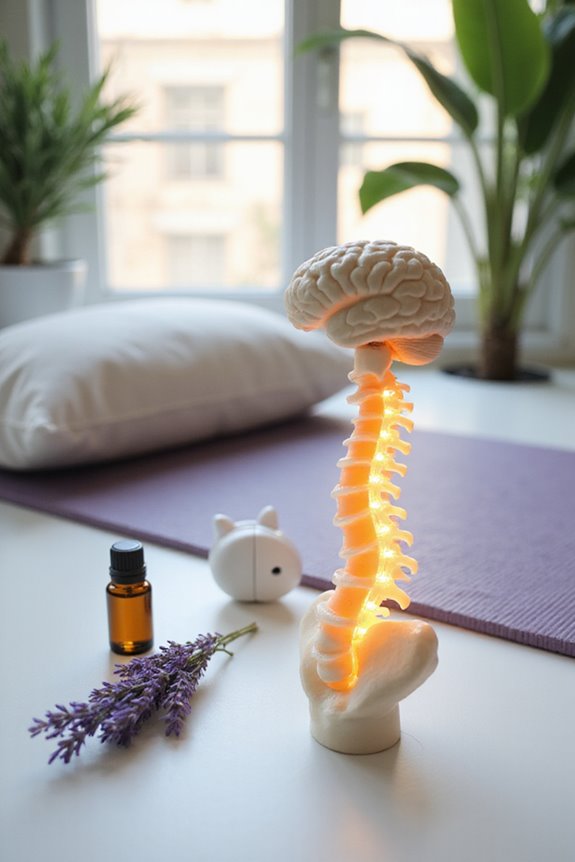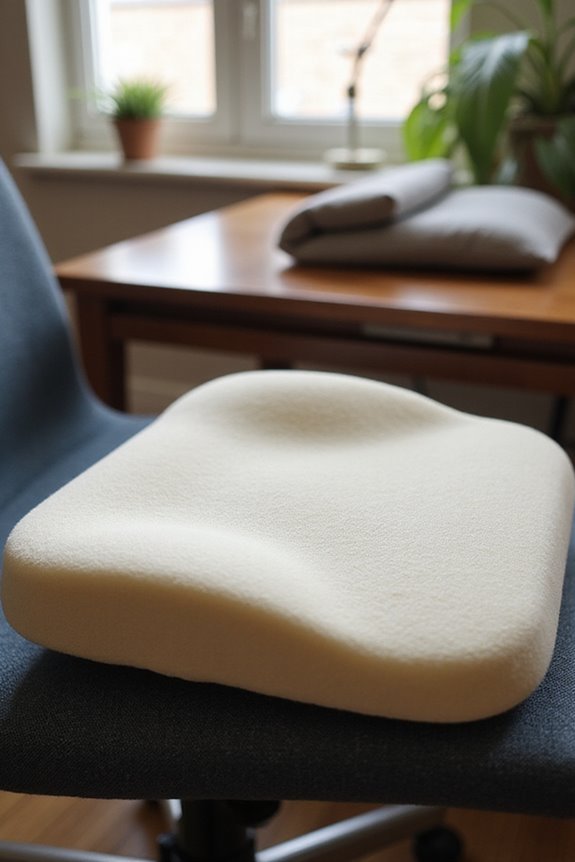Stress management techniques can reduce the likelihood of chronic pain by disrupting the stress-pain cycle. Effective methods, such as mindfulness meditation and cognitive behavioral therapy, lower stress hormones and enhance emotional regulation. Research indicates that improved psychological flexibility correlates with decreased pain perception. Chronic stress is linked to increased pain sensitivity and disability, making stress reduction essential. Understanding these dynamics can lead to better outcomes in pain prevention and management. Further exploration can provide additional insights into this relationship.
Key Takeaways
- Effective stress management techniques can reduce the likelihood of developing chronic pain by interrupting the stress-pain cycle.
- Mindfulness practices and relaxation techniques help lower stress hormones, which may alleviate pain sensitivity.
- Cognitive Behavioral Therapy (CBT) enhances coping strategies, potentially reducing pain severity linked to stress.
- Regular engagement in stress reduction activities fosters emotional well-being, which correlates with lower pain intensity.
- Long-term stress reduction efforts can prevent the onset of chronic pain conditions and improve overall quality of life.
The Interplay Between Stress and Pain
The intricate relationship between stress and chronic pain demonstrates a complex interplay that can greatly impact an individual’s quality of life. This interaction forms a stress pain cycle, where pain intensifies stress responses and vice versa.
- Mutual Reinforcement: Pain activates stress responses, leading to allostatic overload, which deteriorates physical well-being.
- Physiological Mechanisms: Chronic stress disrupts cortisol regulation, increasing pain sensitivity.
- Psychological Factors: Anxiety and maladaptive cognitive responses can heighten pain severity and emotional distress.
Coping strategies are essential for breaking this cycle. Effective approaches may include mindfulness, cognitive restructuring, and social support. Understanding these dynamics is fundamental for holistic management of chronic pain, enhancing overall functional capacity and quality of life.
Understanding Stress Management Techniques

Stress management techniques play an essential role in alleviating chronic pain and enhancing overall well-being. Key methods include:
- Mindful Breathing: This approach activates the relaxation response, lowering stress hormones and reducing pain sensitivity.
- Muscle Relaxation: Progressive muscle relaxation entails tensing and relaxing muscle groups, alleviating physical tension linked to stress-induced pain.
Regular practice of these techniques can disrupt the stress-pain cycle, promoting muscle relaxation and decreasing mental stress.
Other techniques such as mindfulness meditation, yoga, and guided imagery also contribute to pain management by fostering acceptance and improving emotional well-being.
These accessible, low-cost interventions can be performed independently or with professional guidance, supporting a holistic approach to managing chronic pain effectively.
Neurobiological Links Between Stress and Chronic Pain

Neurobiological connections between stress and chronic pain highlight the intricate interplay of physiological and psychological factors. Central sensitization, a key process, results in hyper-sensitization of the central nervous system, leading to chronic pain. Prolonged stress triggers excitatory chemical release, enhancing receptor activity and density, thereby amplifying pain signals.
Key factors include:
- Structural brain changes, particularly in the limbic system, affect pain processing.
- Dysregulation of the hypothalamic-pituitary-adrenal (HPA) axis releases stress hormones that modulate pain.
- Increased neuronal excitability from GABA disinhibition exacerbates pain perception.
Research demonstrates that chronic stress can precipitate or worsen pain sensitization, emphasizing the critical neurobiology of stress in the context of chronic pain conditions. Understanding these links fosters a thorough approach to pain management.
Psychological Factors Influencing Pain Perception

Psychological factors considerably shape pain perception, influencing how individuals experience and interpret pain signals.
- Attention plays a critical role; focused attention on pain increases perceived intensity, while distraction can alleviate it.
- Cognitive biases, such as catastrophic thinking and overgeneralization, can heighten pain perception, whereas positive reappraisal may reduce it.
- Emotional regulation is essential; anxiety amplifies pain perception through heightened responsiveness and attentional focus.
- Personality traits, including anxious attachment styles, contribute to pain experiences, with self-efficacy beliefs predicting recovery outcomes.
- Individuals with a greater sense of control over pain report lower intensity levels, emphasizing the importance of agency in pain management.
Understanding these psychological dimensions can enhance approaches to chronic pain treatment and management.
The Role of Mindfulness and Relaxation

Mindfulness and relaxation techniques have emerged as effective strategies for managing chronic pain. Research indicates significant mindfulness benefits, including reduced pain intensity and emotional distress.
- Mindfulness Meditation: Engages distinct brain mechanisms, decreasing activation in pain-processing areas. It alters the subjective experience of pain by disconnecting it from self-identity.
- Relaxation Techniques: Includes breath focus and body awareness, accessible via various formats such as apps and guided sessions.
- Impact on Pain Management: Regular practice can lower medication needs, enhance quality of life, and reduce psychological components like anxiety and depression.
Mindfulness-based programs, such as Mindfulness-Based Stress Reduction (MBSR), provide structured environments for effective pain management. These strategies offer a drug-free, cost-effective approach adaptable to individual needs, fostering a sense of community among practitioners.
Preventive Strategies for Chronic Pain Development
Preventive strategies for chronic pain development are increasingly recognized as essential components of thorough pain management. Implementing preventive therapies can greatly reduce the risk of chronic pain by addressing underlying stress factors.
Key strategies include:
- Cognitive Behavioral Therapy (CBT): This approach aids in managing stress and altering pain perception, which may prevent pain from becoming chronic.
- Regular Physical Activity: Engaging in exercises such as yoga and tai chi enhances stress resilience and reduces pain sensitivity.
- Healthy Sleep Hygiene: Prioritizing rest mitigates stress-related sleep disturbances that can exacerbate pain.
- Structured Relaxation Techniques: Practices like deep breathing minimize muscle tension, a contributor to chronic pain.
Incorporating these lifestyle modifications into daily routines can effectively diminish the likelihood of developing chronic pain conditions.
Enhancing Treatment Efficacy Through Stress Management
Enhancing treatment efficacy for chronic pain through stress management is supported by a wealth of evidence demonstrating its benefits. Key psychological interventions include:
- Cognitive Behavioral Therapy (CBT): Shows strong evidence in improving chronic pain symptoms and functional limitations.
- Mindfulness-Based Stress Reduction (MBSR): Leads to significant improvements in pain intensity and functionality, with effects lasting up to 52 weeks post-treatment.
- Acceptance and Commitment Therapy (ACT): Enhances psychological flexibility, aiding pain management.
Integrative multimodal approaches combining stress management with other therapies enhance treatment adherence and outcomes. Stress management techniques reduce central sensitization, improve emotional regulation, and foster coping strategies. This holistic approach optimizes wellness, resulting in improved long-term functional recovery and reduced healthcare utilization. Consequently, stress management is vital for maximizing treatment efficacy in chronic pain management.
Future Directions in Research and Clinical Practice
Future directions in research and clinical practice must build on the established link between stress management and chronic pain treatment.
- Understanding Mechanisms: Future research should focus on the biological, neurological, and psychological factors that intersect stress and pain, identifying specific biomarkers for both conditions.
- Clinical Innovations: Development of standardized care models incorporating stress management techniques can enhance treatment efficacy.
- Interdisciplinary Approaches: Collaborative efforts among healthcare professionals are essential for creating thorough treatment plans.
- Theoretical Models: Advancing models like the Pain-Stress Model may clarify the nuanced relationship between stress and pain.
- Mind-Body Interventions: Continued exploration of mind-body practices will provide insights into their role in mitigating chronic pain through stress reduction.
Frequently Asked Questions
How Long Does It Take to See Results From Stress Management?
Timing expectations for stress management results vary widely due to individual differences. Typically, initial improvements may occur within weeks, while significant changes in associated symptoms often require consistent practice over several months for ideal benefits.
Are There Specific Stress Management Techniques for Different Pain Types?
In exploring diverse pain types, techniques like mindfulness meditation and cognitive restructuring emerge, fostering community support. Individuals find solace in shared experiences, discovering that tailored stress management practices can considerably alleviate their unique discomforts and enhance collective well-being.
Can Stress Management Replace Medication for Chronic Pain?
Stress management techniques can aid in stress reduction and provide pain relief; however, they should not replace medication entirely. A thorough approach combining both methods often yields the best outcomes for chronic pain sufferers.
What Role Does Diet Play in Stress and Pain Management?
Diet delivers dynamic advantages in stress and pain management through nutrient balance and inflammation reduction. Emphasizing wholesome, anti-inflammatory foods fosters a sense of community and belonging, enhancing overall well-being and alleviating chronic pain symptoms effectively.
Is Professional Therapy Necessary for Effective Stress Management?
Professional therapy options markedly enhance stress management by providing tailored coping strategies. These structured interventions foster emotional regulation and resilience, creating a supportive environment where individuals can effectively navigate their stressors and enhance overall well-being.





